Wednesday Feb 18, 2026
Wednesday Feb 18, 2026
Thursday, 30 July 2020 00:30 - - {{hitsCtrl.values.hits}}
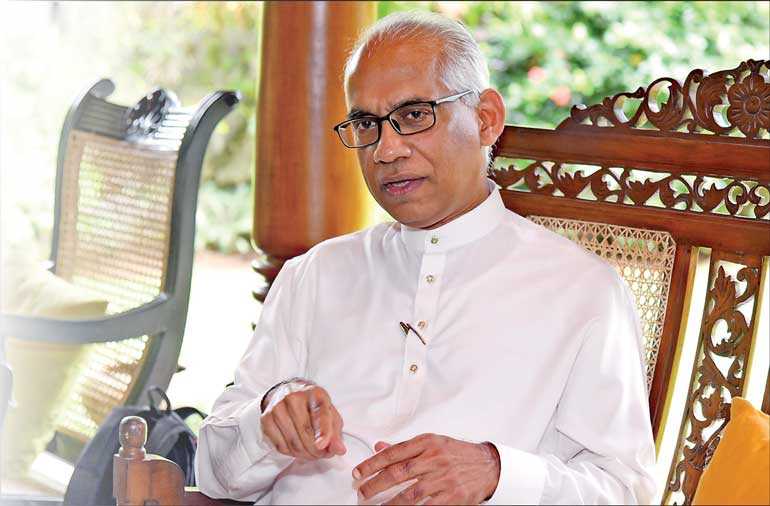
SJB Election Campaign Manager Eran Wickramaratne - Pic by Ruwan Walpola
Samagi Jana Balawegaya (SJB) National Campaign Organiser and former State Minister of Finance Eran Wickramaratne talks to Daily FT on why his party is the best option to change Sri Lanka’s political culture, improve the business climate, and put the country on a sustainable path to growth
By Madushka Balasuriya
Q: How do you think the SJB is going to fare in the polls?
It’s a new party, just a few weeks old, considering this fact, I think it’s going to fare remarkably well. Normally after a Presidential Election the trend in Parliament goes in favour of the President when the General Elections are normally held. However the circumstances this time are different, because the General Election is coming eight months after the Presidential Election. And therefore, people are going to look at the track record of those eight months as well, because there were lots of expectations for the Presidency. I will not be able to predict exactly how the election will go, but I am expecting a strong performance from the SJB.
Because what the SJB is, really is coming through. A political movement that started in 1946 when D.S. Senanayake brought all the different segments of Sri Lankan society together and forged ahead. And then an alternative political movement started in the 1950s – and these are the two main political forces in the country. And clearly SJB is the inheritor of that movement, and that’s where the people are standing.
Q: Do you think the SLPP will get an advantage because of the UNP/SJB split? Would you be open to working with the UNP if both parties end up in Opposition?
This talk about two-thirds is absolute nonsense. The Government is not going to get two-thirds. The conversation is about doing away with the 19th Amendment and centralising power. Which is the risk 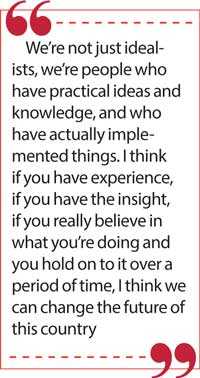 and the danger. Because for 40 years, Presidential aspirants ran in this country saying they would abolish the presidential system, because that’s what people wanted. The 19th Amendment didn’t abolish the presidential system, it just put the checks and balances around it. And those are the things they now want to remove.
and the danger. Because for 40 years, Presidential aspirants ran in this country saying they would abolish the presidential system, because that’s what people wanted. The 19th Amendment didn’t abolish the presidential system, it just put the checks and balances around it. And those are the things they now want to remove.
The SJB will be the main Opposition. And I say that with authority, because all the surveys are basically show that we’re the alternative political force to the present Government. And if anybody’s going to form another Government it’s us, and there’s no other alternative in the country.
And that’s why I said we’re really the inheritors of the political movement that D.S. Senanayake started.
Coming to the second part of your question, I think post-election we have to face the realities. As you know, already we’re open to working with others. Any party or individuals in Parliament, who agree with our philosophy – both our political and economic philosophy – we will work with. Our thing is, we believe that we have the best program to get the country out of the post-COVID problem, and there is a two-year recovery period and what I call a three-year growth period. I think we’re probably best positioned to do that. If people agree with that, then we’re open to working with them.
I think you specifically asked about the remnants of the old party, I’m not looking at individuals, but certainly if anybody agrees with what we’re doing we’ll certainly work with them.
Q: Are you concerned about crossovers post-election?
I think that if you follow our political campaign, as we’re the only alternative in this country, people will stay together. Because one is the possibility of forming a government, and the next alternative is 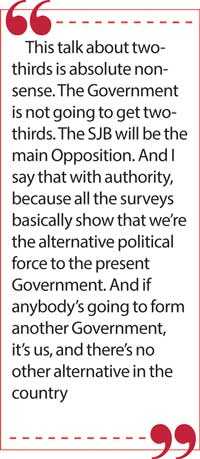 forming the next government anyway. Because in a democracy, from time to time, governments change. And we are the only party presently in the Opposition who can form a government. So I think if you look at the people that we have – and some of these things I’m saying are relative, they’re not absolute – it’s a team which is less tainted; I wouldn’t say anybody has an absolutely clean team because nobody would believe that, but if you look at the individuals in the team, there are no major accusations on the leadership of our team. If you look at competencies of the team, we have a variety.
forming the next government anyway. Because in a democracy, from time to time, governments change. And we are the only party presently in the Opposition who can form a government. So I think if you look at the people that we have – and some of these things I’m saying are relative, they’re not absolute – it’s a team which is less tainted; I wouldn’t say anybody has an absolutely clean team because nobody would believe that, but if you look at the individuals in the team, there are no major accusations on the leadership of our team. If you look at competencies of the team, we have a variety.
The challenge I’m throwing out to any of the other parties is to just compare their teams with our team. And, make no mistake, a team is required.
Some of the people are less known, because they haven’t really held Cabinet office in the previous period. If you talk about infrastructure development, if you talk about housing, if you talk about the economy, you talk about the new economy – digitalisation, electronics – and the number of the people with the backgrounds that we have, these are some of Sri Lanka’s future – these are where the next governments are coming from. If you talk about the track record on national integration and building a Sri Lankan identity and getting all the communities to work together – I mean, you look at any particular area, whether it’s social, political or economic, I certainly think that we have the better team.
But we’re going to pursue what we think is the better political and economic program for the country.
I think if you look at our entire post-independence history, we need a complete change. We need to put this country in the hands of a new group of people, who are not tainted by political power in the past. If you look at the front row in the last Parliament, on that side you have a Prime Ministerial candidate who has been in politics for 50 years, who has been Minister, who has been Prime Minister, who has been President twice, and is now seeking office again. On this side you have a candidate who has been in politics for 40 years, who has been Minister, who has been Prime Minister four times, and is also seeking to lead a team.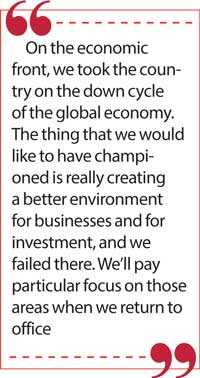
Tell me of any institution anywhere in the Government, non-Government or private sector, which has had people leading it for such a long period?
Therefore compromising and joining won’t help, we need a clean cut. We need a new leader, a new team, we need ideas, a new generation, and we need to make a break with the past in taking this country forward. And we have to change the political culture in this country.
The excuse that things can only be done if you pay something, the excuse that the system will only move based on corruption: we need to break through this.
We’re not just idealists, we’re people who have practical ideas and knowledge and who have actually implemented things. We believe that within a good governance framework, within the rule of law, creating the right environment, you can achieve it. I’m sure other countries in South East Asia went through these troubles from Singapore to Japan, and they succeeded because there were a few people who actually believed in them.
I think if you have experience, if you have the insight, if you really believe in what you’re doing and you hold on to it over a period of time, I think we can change the future of this country.
Q: In many people’s eyes the process that you began in 2015 has been discredited. So how are you going to regain public faith in the party’s ability to promote good governance?
If you particularly look at its failures, we have to really ask ourselves the question ‘who failed?’ And if you look at the past period of government, there were three exogenous factors which really made it difficult to manage the economy. One was in 2017: we had droughts and floods. In 2018 you had a coup, and in 2019 you had the Easter Sunday bombings.
Who is responsible for the coup? Those responsible are those in the present Government and the former President. What’s the damage done? Enormous damage. If you look at coups in the past decade, around the world, hardly any but Sri Lanka had one.
Not just the political damage, but economic damage: people lose confidence. Because investors are looking for the rule of law, investors are looking for certainty. The economic consequences of the coup – people are often talking about the bond transaction, and I often ask the question what’s the loss – and the loss because of the coup is incalculable.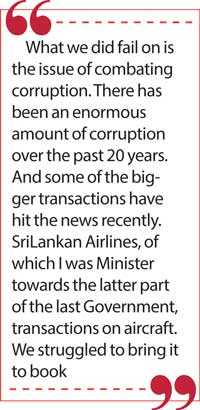
That’s the track record of the people who are presently in power. The track record is that Mahinda Rajapaksa actually agreed to it, it’s terrible. The track record of Mahinda Rajapaksa was to buy over MPs, get the majority in Parliament, and do away with the term limits on the Presidency. The track record of Mahinda Rajapaksa was to dismiss the Chief Justice of the country. The track record was conflicts of interest – same family, head of the Executive, head of the Legislature. And these are often not talked about.
Then who is responsible for the Easter Sunday bombings? The President of the country has intelligence forces directly reporting to him. If the PM had attended the Security Council, he would’ve also received some information, which he may have shared with his Cabinet. But as it’s turned out now, he wasn’t invited nor did he attend. So he has a responsibility for not really attending, but the others didn’t even know the details that were briefed.
So when people say the former Government is responsible, I think we need to look at it more deeply. Who was responsible, who actually knew? Why were they silent? Why didn’t they act?
I want to say, the SJB leadership doesn’t carry that responsibility.
Q: What are the key policies of the SJB? Are they the same as what you wanted to champion in 2015-2019, but could not? What will be done differently if you are elected into government?
On the governance side, I think we had achievements. Empowering citizens, right to information (RTI), protecting freedoms. We had achievements on separating the independence of the Judiciary from the Executive. We had achievements in the 19th Amendment. We had achievements on national integration. But in all these achievements, people will say that we could have gone much further.
What we did fail on is the issue of combating corruption. There has been an enormous amount of corruption over the past 20 years. And some of the bigger transactions have hit the news recently. SriLankan Airlines, of which I was Minister towards the latter part of the last Government, transactions on aircraft. We struggled to bring it to book. Finally after years of investigations, those suspected have been taken in.
MiG transactions that were being swept under the carpet have come to life. For the first time in Sri Lanka’s history, an extradition order from another country has been carried out and the main suspect has been brought here.
I would still say it’s a failure on corruption. Lots of allegations in the past on bond transactions, and I’m not referring to just the one transaction that people are referring to. But the forensic reports show the processes over a long period of time have not been satisfactory.
I regard all of these as the failures of the past, because this needs to lead to prosecutions and it needs to lead to punishment. That’s how you put a country right.
On the economic front, we took the country on the down cycle of the global economy. The thing that we would like to have championed is really creating a better environment for businesses and for investment, and we failed there. Because of the bureaucracy – whether you have to get land, utilities, whether you have to register a company. Then if you take the new generation, they have lots of ideas, and in a way government intervention in that area was a failure, and that’s something we should have been championing.
And we’ll pay particular focus on those areas when we return to office, because we think the new growth is going to come from some of those areas.
Q: What are the measures the SJB is proposing to put debt on a more sustainable path?
There are a few immediate issues and long-term issues on that. The immediate issues are cash flow issues. Fortunately when we left office, we had reserves of about $ 7.5 billion or something like that.
Really the crisis begins next year, it starts by us having to pay over $ 4 billion next year, and also more than that in the year that follows. The data coming out over the last 3 or 4 months is fuzzy, we don’t really have actually data. My guess is that reserves are at a low. Which means that the Government has to bolster those reserves. So in bolstering those reserves, there are several measures that need to be taken.
The path that we would follow is to work with the international community. We will try to ease the present structural debt that we have with our partners by actually talking to them. This is where international relations and partnerships actually work.
The other thing we will do is with an understanding, with the IMF, World Bank etc. I would say we would look to source more concessionary financing. And also look to improve the cash flow with the OECD.
To get over the cash flow, we need about $ 5 billion, and then I think getting some understanding and midterm measures in place. I’m talking really a 2023 plan.
Then in terms of the longer term, our future lies really in investments and actually getting money coming in. To do that, the country’s ratings have to be stabilised. Since the President took over the ratings actually went down – normally when a new President is elected, there is a show of confidence. There was no show of confidence here. That’s very unfortunate, and it’s continued to go down.
If people recognise that we have a plan, we have competent people behind the plan, and these people can be trusted, I think things will begin to stabilise. And when the indicators begin to change in the right direction, then the ratings agencies will say this has a midterm future.
That’s why I talk about a two year recovery period and a three year growth period post that. You won’t get investors walking in immediately.
Q: The SJB manifesto calls for a Post-COVID Investment and Development Fund (PCIADF) to revitalise a weakened economy. Where are these funds going to come from? The budget deficit is expected to be as high as 9% this year, and we don’t have fiscal space to give money to companies to expand. Where are you going to find funds?
It’s more a five year development fund and it will be more relevant to the growth period rather than to the recovery period. In the recovery period, the Government will have to do what is possible. Clearly you’re right, the fiscal space is limited. Because of this, on the welfare side we’ll have to prioritise.
On the other side, we have to find ways and means, where SMEs and particular export-oriented companies will have to be favoured. Because choices will have to be made.
There are two main areas of support people are looking for, one is on cash flow – so debt or concessionary debt, longer term; for example, in the tourism industry we have suggested a complete grace period of two years, and then a 10-year recovery period. So again we’ll have to look at it very carefully.
Because the fiscal space is limited, we can’t be as generous as some of the other countries in Europe and say we will provide large support for employment on salaries etc. I won’t dismiss completely looking at that in more detail.
Q: What are your views on the Government’s treatment of the Central Bank and its refinancing facility? Do you think there is a better approach to get banks to help alleviate the economic impact of COVID-19?
Banks have to be independent, because there are two sides, a depositor and a borrower. We have seen over the last few decades the disaster in the financial companies. The credit of the Sri Lankan banking system has remained strong. We’ve had one bank fail, one big bank shake, but the banking system has more or less stabilised. One contributory factor to that is the independence of the Central Bank.
The Central Bank is still the regulator of the system, and their independence must remain. Central Banks globally have two big responsibilities, one is financial stability and the other is control of inflation. And those objectives are independent of fiscal policy and the Government of the day. And that must remain. It was a little worrying to see how the President didn’t quite understand that.
The depositors must be protected, because by solving one problem you can’t start a bigger problem. Because then Sri Lanka could be in a huge mess. If the Government wants to have borrowers, it can’t come at the expense of the banks, it has to come at the expense of the Government or the Budget.
There are mechanisms that can be used there, one is subsidies, and then how much can the Government afford. Second mechanism is that the Government could provide the banks certain levels of comfort and guarantee, so that the banks will prudently go about making their decisions.
If you ask me in terms of priority, protect your banks, then protect your businesses. If you reverse it, you will be in a much bigger mess.